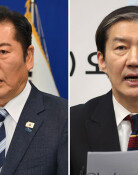What`s wrong with next year`s budget bill?
What`s wrong with next year`s budget bill?
Posted September. 06, 2000 17:34,
From the very initial stage, the work of preparing next year`s budget billis hitting a snag.
While the government-proposed bill is being criticized for makingthe people`s burden heavier, not only opposition party lawmakers, but some lawmakers ofthe ruling Millennium Democratic Party have raised objections against it.
In particular, the objections by the low-income people, middle class andbusiness world are stronger.
It is likely that there will be much troubles in the course ofthe bill being approved by the National Assembly.
No measures to help narrow gap between rich and poor
In particular, the government Monday introduced a package of drastic reform plans on tax system on energy tax rates and pension. The proposed revision bills mean that the government seeks to increase taxrevenues to have the both ends of finance meet in 2003 through the reformed tax formula.
In some aspects, it is necessary to increase the tax yields to some extent in order to manage the state affairs normally, while reducing deficits infinance.
But, the government is going to secure an additional 5.1 trillion won of tax revenue by sharply raising tax rates on energies, such as LPG (liquefiedpetroleum gas) and light oil which low-imcome people mainly use.
And the government gave no heed to working out measures to re-distributeincome to narrow ever-widening gap between rich and poor, and to protect peoplein low-income brackets.
Insufficient support for medical reform
The government has earmarked about 3-3.5 trillion won of budgetto better the treatment of public servants and to supportrestructuring in the financial sector for which the vernment is considerablyresponsible.
Of course, the amount is still far short, but it clearly shows that thepeople eventually ought to assume responsibling for the failure of the governmentpolicies.
Of the budget for the Ministry of Health and Welfare, 1.8 trillion won was allotted as subsidies for medical insurance of enterprises, but thisbudget has also a considerable problem. If the government extends such a small subsidy for premiums for clinics and hospitals, a sharp raise by 40 to 50percent of premiums is inevitable, thus increasing the people`s burden.
Why did gov`t reduce investment in SOC?
The most problematic field, particularly, is social overhead capital.
The government allotted 66.5 billion won as investment in the project to electrify the Honam (Seoul-Mokpo) Railway Line which kicks off next yearunder a goal to complete in 2004.
But it earmarked drastically reduced budget from this year`s for the construction of West Coast Expressway and Daejeon-Jinju Expressway.
Prof. Lee Man-Woo of Korea University said, "The construction industryfaces a critical moment with people saying the business is the worst since the founding of the nation by Dangun." "If the investment in infrastructures isreduced, not only the construction industry is frustrated, but the number of the unemployed would would increase and it may leads to the overallstagnation."
Citing austerity budget, 13 trillion to be subsidized
Meanwhile, despite the compilation of an austerity budget, the subsidiesfor local governments` finances increased by 2 trillion won to 10.3 trillion won, and the subsidies for education finance also rose 3.4 trillion won to 13trillion.
The authority of the central government has been almost not transferred tothe local governments. Under this situation, if only the subsidies for local autonomous bodies increase sharply, this evidences that the taxes paid by the people are eventually not used appropriately.



![[단독]이혜훈 “장남 다자녀로 연대 입학”…당시 그런 전형 없었다](https://dimg.donga.com/c/138/175/90/1/wps/NEWS/IMAGE/2026/01/23/133215083.1.jpg)



